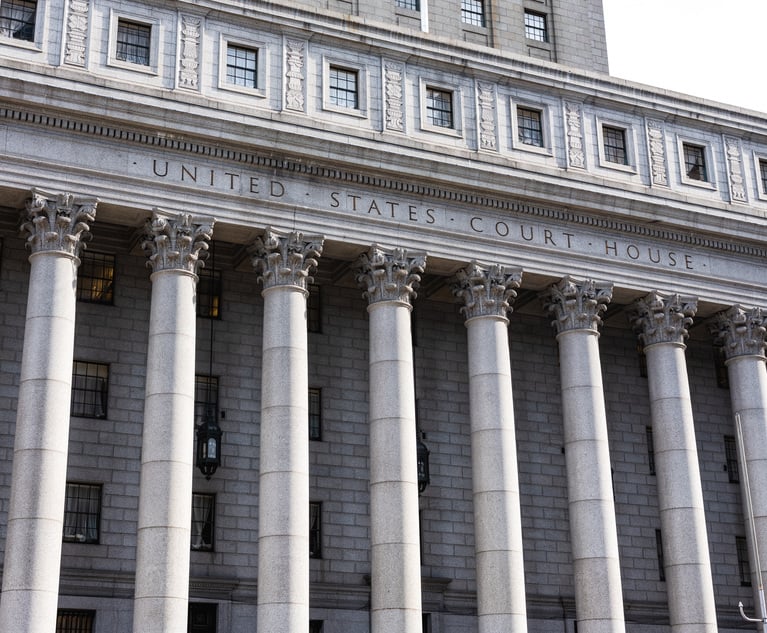Appeals Court Rejects Bid for Open Access to Police Personnel Records
The Appellate Division, First Department affirmed a lower court's ruling that Civil Rights Law 50-a prevents attorneys from getting their hands on records relating to misconduct allegations against officers and punishments they received via the state's Freedom of Information Law.
January 18, 2019 at 05:27 PM
4 minute read
 New York City Police Department cruiser.
New York City Police Department cruiser.
Organizations that are challenging a controversial New York State law that allows police departments to keep officers' disciplinary records from the prying eyes of open records requests have been dealt another defeat in the courts.
A panel from the Appellate Division, First Department affirmed a lower court's ruling that the law, Civil Rights Law 50-a, prevents attorneys from the New York City Legal Aid Society and Cleary Gottlieb Steen & Hamilton for the New York City Police Department from getting their hands on records relating to misconduct allegations against officers and punishments they received via the state's Freedom of Information Law.
The First Department's ruling comes less than a month after the state Court of Appeals issued a 5-2 decision to deny the New York Civil Liberties Union's effort to access documents related to disciplinary proceedings that arise when the Civilian Complaint Review Board refers allegations to the CCRB.
Justices David Friedman, Rosalynn Richter, Barbara Kapnick and Troy Webber joined on the brief, two-paragraph order to affirm a 2017 ruling by Manhattan Supreme Court Justice Joan Lobis that the plaintiffs' requested files are exempt from FOIL.
The First Department cited the Court of Appeals ruling against the NYCLU in December, in which Judge Michael Garcia, writing for the majority, said that the requested materials could be used for “degrading, embarrassing, harassing or impeaching” a police officer.
Cynthia Conti-Cook, a staff attorney for Legal Aid's special litigation unit, said that up until a few years ago, police disciplinary summaries, which Legal Aid has been attempting to obtain, were available to the public for decades.
“Today's ruling against open government and accountability will further sow distrust in law enforcement and will amplify the harm inflicted by the police on black and Latino communities, who have even fewer means to hold the NYPD accountable for abuse and misconduct,” Conti-Cook said. “The Legal Aid Society will appeal this decision and continue our campaign with advocates from across New York to fully repeal 50-a this legislative session.”
The exemptions offered under 50-a, which have been on the books since the 1970s, were not widely known until the 2014 death of Eric Garner, who died while NYPD Officer Daniel Pantaleo held him in a choke hold. A Staten Island grand jury decided against criminal charges in the case, but Pantaleo still faces NYPD disciplinary charges.
A growing number of groups, including the New York City Bar Association, have thrown their support behind efforts to repeal 50-a; even officials from the New York City government, which has been victorious in cases regarding 50-a, has supported changes to the law.
Nicholas Paolucci, a spokesman for the city's Law Department, said that while the First Department agreed with the city's position that disclosing the requested records is not permitted under current state law, the city supports amending 50-a to “allow greater disclosure.”
Efforts to change the law have been met with stiff opposition from the Policeman's Benevolent Association, which argues that allowing disclosure of officers' personnel records puts their lives at risk.
In the previous legislative session, State Assemblyman Daniel O'Donnell, a Manhattan Democrat, sponsored a bill to narrow the exemptions offered under 50-a to performance valuations, but the bill stalled in March.
O'Donnell's bill was co-sponsored by State Assemblyman Dan Quart, also a Manhattan Democrat, who has proposed a bill in the current session that would exclude footage from officers' body-worn cameras from the 50-a exemption.
Quart said that O'Donnell plans to reintroduce legislation to repeal 50-a this session and that, with Democrats in control of the Senate, it might have a better shot at passing.
“Last session, with a Republican-controlled Senate, the likelihood of success was zero,” Quart said. “A full repeal is long overdue and with a newly elected Democratic majority, we finally have a real shot at repealing one of the worst anti-transparency laws in the country.”
Read more:
NYPD Can Withhold Disciplinary Records From Public, NY Court of Appeals Holds
Attorneys Sue NYPD for Body Cam Footage From Fatal Shooting of Mentally Disturbed Man
As Law to Open Police Records Is Debated, Tribunal Denies Bid to Shield Info
This content has been archived. It is available through our partners, LexisNexis® and Bloomberg Law.
To view this content, please continue to their sites.
Not a Lexis Subscriber?
Subscribe Now
Not a Bloomberg Law Subscriber?
Subscribe Now
NOT FOR REPRINT
© 2025 ALM Global, LLC, All Rights Reserved. Request academic re-use from www.copyright.com. All other uses, submit a request to [email protected]. For more information visit Asset & Logo Licensing.
You Might Like
View All
Decision of the Day: Qui Tam Relators Do Not Plausibly Claim Firm Avoided Tax Obligations Through Visa Applications, Circuit Finds

'Serious Legal Errors'?: Rival League May Appeal Following Dismissal of Soccer Antitrust Case
6 minute read
Decision of the Day: Judge Sanctions Attorney for 'Frivolously' Claiming All Nine Personal Injury Categories in Motor Vehicle Case

Trending Stories
- 1ACC CLO Survey Waves Warning Flags for Boards
- 2States Accuse Trump of Thwarting Court's Funding Restoration Order
- 3Microsoft Becomes Latest Tech Company to Face Claims of Stealing Marketing Commissions From Influencers
- 4Coral Gables Attorney Busted for Stalking Lawyer
- 5Trump's DOJ Delays Releasing Jan. 6 FBI Agents List Under Consent Order
Who Got The Work
J. Brugh Lower of Gibbons has entered an appearance for industrial equipment supplier Devco Corporation in a pending trademark infringement lawsuit. The suit, accusing the defendant of selling knock-off Graco products, was filed Dec. 18 in New Jersey District Court by Rivkin Radler on behalf of Graco Inc. and Graco Minnesota. The case, assigned to U.S. District Judge Zahid N. Quraishi, is 3:24-cv-11294, Graco Inc. et al v. Devco Corporation.
Who Got The Work
Rebecca Maller-Stein and Kent A. Yalowitz of Arnold & Porter Kaye Scholer have entered their appearances for Hanaco Venture Capital and its executives, Lior Prosor and David Frankel, in a pending securities lawsuit. The action, filed on Dec. 24 in New York Southern District Court by Zell, Aron & Co. on behalf of Goldeneye Advisors, accuses the defendants of negligently and fraudulently managing the plaintiff's $1 million investment. The case, assigned to U.S. District Judge Vernon S. Broderick, is 1:24-cv-09918, Goldeneye Advisors, LLC v. Hanaco Venture Capital, Ltd. et al.
Who Got The Work
Attorneys from A&O Shearman has stepped in as defense counsel for Toronto-Dominion Bank and other defendants in a pending securities class action. The suit, filed Dec. 11 in New York Southern District Court by Bleichmar Fonti & Auld, accuses the defendants of concealing the bank's 'pervasive' deficiencies in regards to its compliance with the Bank Secrecy Act and the quality of its anti-money laundering controls. The case, assigned to U.S. District Judge Arun Subramanian, is 1:24-cv-09445, Gonzalez v. The Toronto-Dominion Bank et al.
Who Got The Work
Crown Castle International, a Pennsylvania company providing shared communications infrastructure, has turned to Luke D. Wolf of Gordon Rees Scully Mansukhani to fend off a pending breach-of-contract lawsuit. The court action, filed Nov. 25 in Michigan Eastern District Court by Hooper Hathaway PC on behalf of The Town Residences LLC, accuses Crown Castle of failing to transfer approximately $30,000 in utility payments from T-Mobile in breach of a roof-top lease and assignment agreement. The case, assigned to U.S. District Judge Susan K. Declercq, is 2:24-cv-13131, The Town Residences LLC v. T-Mobile US, Inc. et al.
Who Got The Work
Wilfred P. Coronato and Daniel M. Schwartz of McCarter & English have stepped in as defense counsel to Electrolux Home Products Inc. in a pending product liability lawsuit. The court action, filed Nov. 26 in New York Eastern District Court by Poulos Lopiccolo PC and Nagel Rice LLP on behalf of David Stern, alleges that the defendant's refrigerators’ drawers and shelving repeatedly break and fall apart within months after purchase. The case, assigned to U.S. District Judge Joan M. Azrack, is 2:24-cv-08204, Stern v. Electrolux Home Products, Inc.
Featured Firms
Law Offices of Gary Martin Hays & Associates, P.C.
(470) 294-1674
Law Offices of Mark E. Salomone
(857) 444-6468
Smith & Hassler
(713) 739-1250






